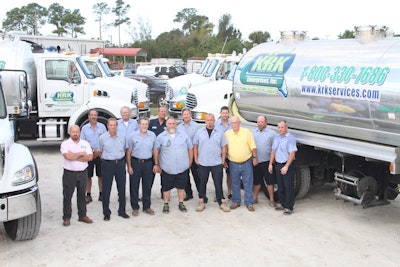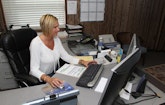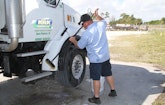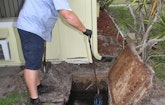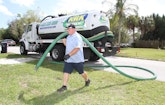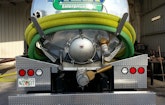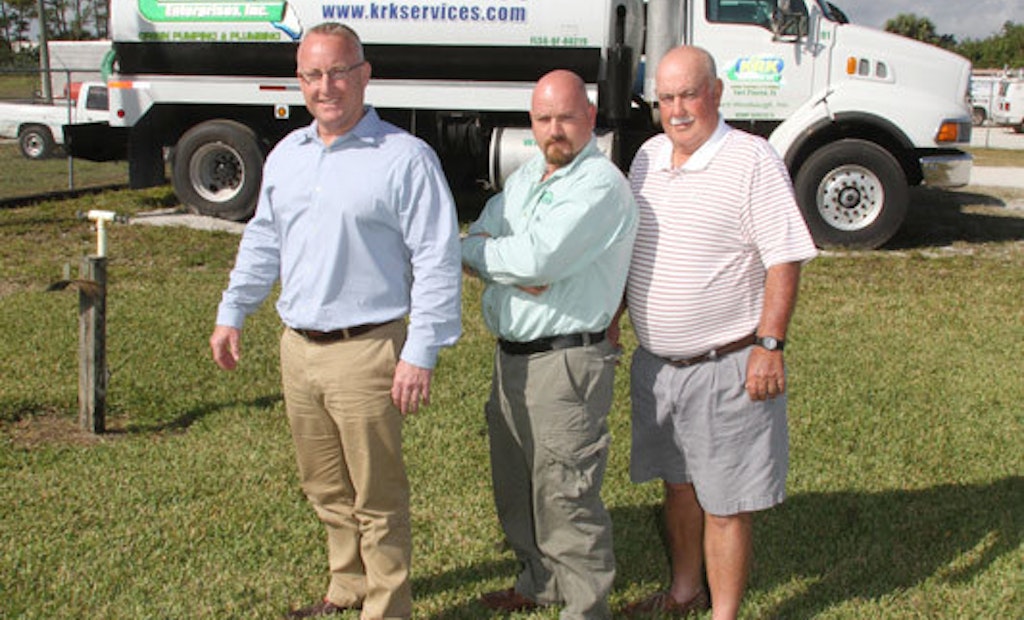
Interested in Trucks?
Get Trucks articles, news and videos right in your inbox! Sign up now.
Trucks + Get AlertsStarting about a decade ago, septic service companies in southeast Florida got hit with one situation after another that negatively impacted their businesses – hurricanes, the recession, counties converting to sewer systems. Kyle Kelly, general manager of KRK Enterprises Inc., in Fort Pierce, Fla., says its sales were cut in half, as was its staff. To turn things around, the company made a course change and started focusing more on commercial grease trap work for restaurants and grocery stores, increasing that part of its business from 40 to 85 percent.
“We still provide all the residential services,” Kelly says, “but the reality is most of our work now is commercial, prescheduled work for statewide clients.” The company also offers plumbing, jetting, and sand and sludge pumping. The change in focus has provided a more reliable source of revenue but has also increased the company’s legal reporting requirements and the distances it must travel. The company now works throughout Florida and parts of Georgia to service its accounts, many of them large national chains.
BUSINESS TRANSFORMATIONS
The company and its ownership have been through a few iterations over the years. KRK was established in 1994 by three partners – Kyle Kelly, his father, Marvin Kelly, and Paul Revels. Revels was later bought out. The company owned pastureland and ran a land application operation along with two lime stabilization treatment facilities.
About 1998, with tighter legal restrictions, they decided to sell. “When it was no longer a benefit to do it ourselves we sold off the cattle, sold the land and just started to pump and dump at the closest facility available,” Kelly says. Later, the company made a decision to perform grease trap and septic work statewide, while continuing to do plumbing and drain cleaning work.
Today the company has 20 employees. As a succession plan, it established the Kelly Family Irrevocable Trust. Marvin owns all the shares, which, upon his death, will pass to Kyle.
CHALLENGES LOOM
Residential pumping once accounted for the bulk of the company’s work. But Kelly says about seven years ago counties started pushing for homeowners in his territory to connect to city sewer lines, and that began to cut into their business.
Then, to make matters worse, the area experienced a couple of record-setting hurricane seasons followed by a downward spiral in the economy – and then the collapse of the real estate market. For homeowners still on septic systems, there was a shift from preventive maintenance to emergency work only. Attempts to pass legislation requiring preventive maintenance failed.
As it had always done in the past when something wasn’t working, the company decided it was time to try something else. It started shifting the business mix toward commercial pumping accounts, pursuing and landing an account with a local store that’s part of a discount retail chain. “It got us organized to handle that large of a client,” Kelly says. “We got the infrastructure set up to handle interstate dealings and multiple locations.”
MARKETING MOVES
Growing a customer base of national clients is a slow process and requires a different approach than residential. It’s not easy finding the right person in an organization to talk to. And getting face time with decision-makers is even harder, Kelly says. In other cases the company has picked up work from online bids and referrals.
It has also worked with an outside consultant to rebuild its website. “Most of our business is commercial clients ... how do you get their business?” Kelly says. “I don’t know if an ad on the Internet does it. You’ve got to be there so when they search your name, you do come up and they can check out your information.” The latest version is also more mobile device-friendly.
While increasing its marketing, the company has decreased spending on advertising, cutting way back on radio, billboard and phone book ads, and eliminating commissioned salespeople.
It is also quick to offer collateral work to existing clients. “You get your foot in the door with one service then springboard from that to providing other services,” Kelly says. “If you do a good job in one area, they’ll use you in others.”
ON THE ROAD
The company’s commitment to servicing national accounts has meant traveling significant distances – resulting in drivers being on the road all week, living out of hotels.
“It definitely takes a unique employee who has the flexibility to be gone all week,” Kelly says. Fortunately, the company has not had problems finding employees. Each driver has a particular route. “One guy goes south, one covers the west, another couple of guys go north,” he says. Drivers typically leave Monday morning and return Friday evening. There are also two local drivers, one for days, one for the night and weekend shift.
The company has 10 vacuum trucks, 2001-2012 models. The two newest ones are Freightliners, the others Sterlings. Some tanks are steel; the latest six are aluminum. Sizes range from 4,000 to 4,800 gallons. Pumps are mostly Jurop 260 cfm units. Builders are Pik Rite Inc., TankTec, Progress Tank and Amthor International.
Other equipment includes a Vac-Con on a 2007 International chassis with a 12-cubic-yard solids tank for pumping sand and sludge; a 2003 Case backhoe; a 2005 Caterpillar skid loader for drainfield repairs and installs; three Chevrolet 1500 vans; a Ford F-350 with a utility box and crane; RIDGID SeeSnake cameras; Harben Inc. jetters; and a 2013 industrial Conde ProVac pump (Westmoor Ltd.) for cleaning interior grease traps.
Vehicles are serviced in-house every 10,000 miles. Washing is done weekly. “The guys wash them themselves on the wash rack out back, or they’ll have them professionally done at a local truck wash,” Kelly says. “They’ll typically come in on weekends so they’re ready to go Monday morning.”
TIGHTENING REGULATIONS
Another side to commercial work that’s been a challenge are the many legal requirements. The company is faced with increasing paperwork as customers pursue stricter maintenance standards. Kelly says reporting duties are growing all the time, to the point it’s now a significant part of the job. “That’s been one of the biggest changes over the years – just the accountability in the field and the inspectors out there looking for problems,” he says.
The nuisance factor is compounded because the company is dealing with two states and numerous cities and counties, each with its own set of rules and regulations. “Some require no information, others want piles of it,” Kelly says. In some cases the company can use generic forms, in others it can’t.
The documentation is a three-part manifest that captures the story, Kelly says. Drivers bring the paperwork with them to every job. They sign off as the transporter, the store or restaurant signs off as the generator and the dump facility signs off as the receiver. From there, it’s handed off to the KRK staff person responsible for getting it scanned and emailed to the appropriate governing authorities. “She serves as the funnel point to make sure everybody gets copies,” Kelly says.
Kelly thinks some counties have unrealistic requirements regarding BOD levels that customers can’t possibly meet. “There are things going on in the industry that are definitely challenges,” he says. “Our clients are being fined, and there’s nothing we can do about it. Even if we pumped them monthly, they’re still not going to meet the parameters. We’re stuck in the middle without an answer for them.”
There is an offsetting upside to the requirements. “It’s good for the industry in one sense,” Kelly says, “because it forces people to have maintenance. We’ve gotten a lot of business just out of the fear factor of companies being fined by failing to maintain their grease traps appropriately.”
COMMERCIAL SUCCESS
Recovering from the challenges of the mid 2000s has been a slow but steady process for KRK. It is not quite back to where it was were pre-recession, but it is getting close.
The focus on commercial work has paid off. “We have the equipment, we have the resources available to do it,” Kelly says. “Not too many people can handle servicing the whole state. It’s been a nice niche for us.”
MORE INFORMATION
Amthor International - 800/328-6633 - www.amthorinternational.com
Case Construction Equipment - 866/542-2736 - www.casece.com
Caterpillar, Inc. - 309/675-1000 - www.cat.com
Harben, Inc. - 800/327-5387 - www.harben.com
Jurop - www.jurop.it/eng
Pik Rite, Inc. - 800/326-9763 - www.pikrite.com
Progress Tank - 800/558-9750 - www.progresstank.com
RIDGID - 800/769-7743 - www.ridgid.com
TankTec - 888/428-6422 - www.tanktec.biz
Vac-Con, Inc. - 888/491-5762 - www.vac-con.com
Westmoor, Ltd. - 800/367-0972 - www.westmoorltd.com
